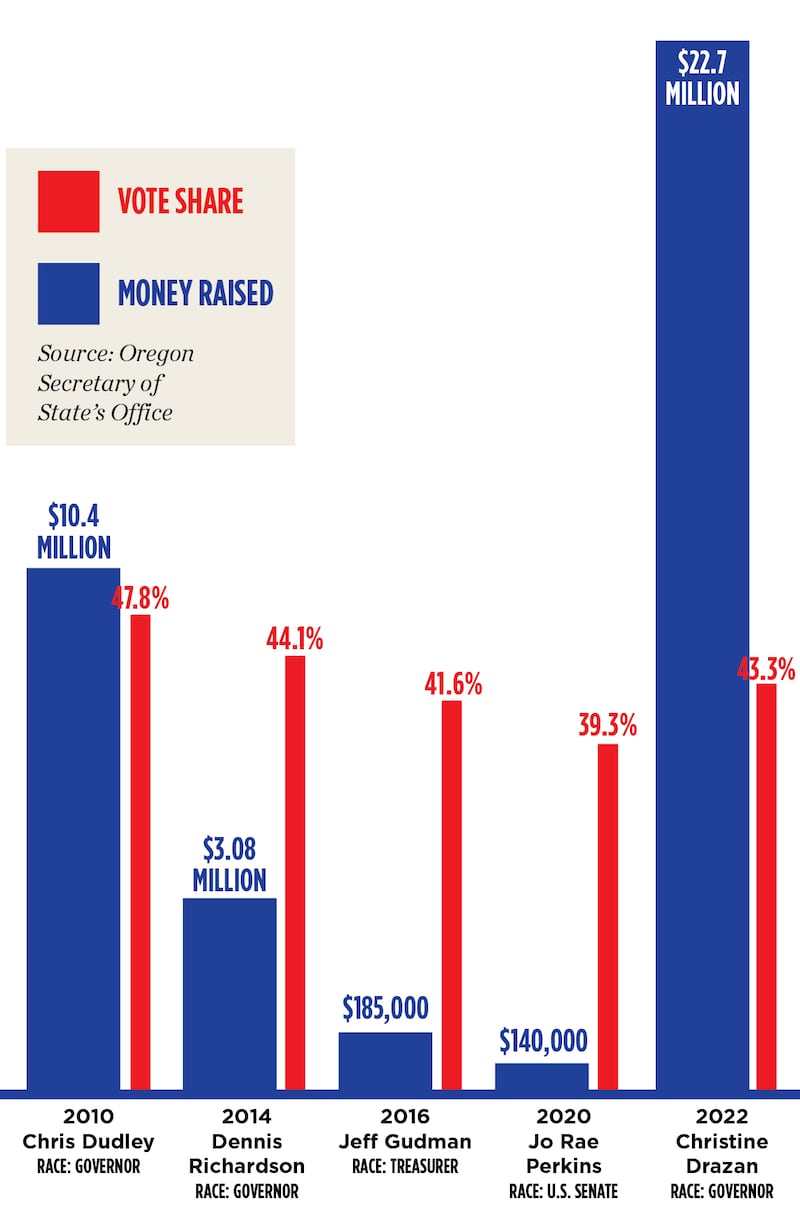One of the most puzzling results of last week’s election was the performance of Jo Rae Perkins, the GOP nominee for U.S. Senate.
Despite raising just $92,000, Perkins, 66, an election-denying, MAGA-loving, twice-bankrupt perennial candidate from Albany who had expressed support for the Jan. 6 coup attempt and shown more than a passing interest in QAnon, garnered nearly 41% of the vote in her challenge to Oregon’s longest-serving member of Congress, U.S. Sen. Ron Wyden.
Perkins may be an extreme example, but pretty much every election cycle, GOP candidates—some credible and well funded, some not—get more than 40% of the vote. But not much more.
“You could argue that people who are totally unqualified can still get above 40%,” says Jack Roberts, the former two-term labor commissioner who also ran statewide for governor and Oregon Supreme Court justice.
With few exceptions (such as when Dennis Richardson won the secretary of state’s race in 2016), GOP candidates, no matter who they are, cluster in the low to mid-40s: The last three GOP nomineeses for governor, Dr. Bud Pierce (2016), Knute Buehler (2018) and Drazan, all got between 43% and 44%.
Over the past decade, some statewide Republican candidates have spent a lot: Drazan spent $22.7 million. Some have spent almost nothing—and done just as well as the big spenders.
In 2020, for instance, Republican Michael Cross ran for attorney general. Cross, a software designer, is not a lawyer, had never run for office before, and spent just $11,333, about one-fiftieth of what incumbent Ellen Rosenblum spent. Nonetheless, 934,357 Oregonians voted for him—41.4% of the vote. (Disclosure: Rosenblum is married to Richard Meeker, the co-owner of WW’s parent company.)
Perkins also ran for U.S. Senate in 2020, getting 39.3% against U.S. Sen. Jeff Merkley (see chart). In her two races for Senate, she’s spent less than $250,000, while her opponents have collectively spent more than $20 million.
“There is a glass ceiling and a hard wood floor for statewide Republican candidates,” says state Rep.-elect Kevin Mannix (R-Salem).
Mannix ran twice for attorney general, twice for governor, and once for Congress (he got 46% in the 2002 governor’s race against Democrat Ted Kulonogski), in addition to numerous legislative races. He says if Republicans want to win, they need to change their approach.
Mannix thinks Oregon voters perceive Republicans as too interested in small government and not interested enough in solving problems.
“The glass ceiling can be broken or pushed up higher,” Mannix says, “but we have to stop presenting ourselves as the chronic minority party, sitting on our hands in complaint instead of finding solutions or compromises.”
Here are some typical finishes:

Source: Oregon Secretary of State’s Office

